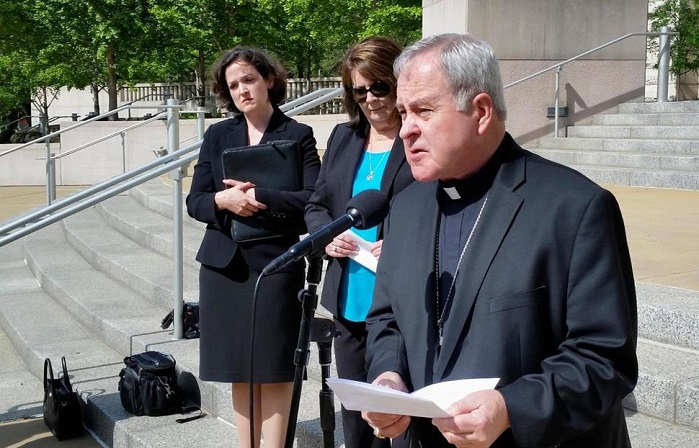Several Missouri Catholic groups filed a lawsuit Monday challenging a St. Louis ordinance that could force them to hire abortion activists and rent to pro-abortion groups.
The Catholic Archdiocese of St. Louis, the pro-life maternity home Our Lady’s Inn and a local Catholic businessman said the city ordinance violates their constitutional freedoms. In their lawsuit, they ask the court to block the city from enforcing the measure.
In February, the St. Louis Board of Alderman passed the ordinance to make their city a “sanctuary” for abortion. Supposedly, the purpose of the ordinance is to protect people from discrimination based on their reproductive health decisions.
However, pro-life and religious groups said the ordinance would force religious organizations and individuals to support abortion and abortion advocacy. They said it could force landlords to rent property to abortion providers or abortion advocacy groups, and punish employers (including religious schools and pro-life organizations) that refuse to hire someone who publicly supports abortion.
During a news conference Monday, St. Louis Catholic Archbishop Robert Carlson described the pro-abortion ordinance as “vile” and said the archdiocese will not comply with it, the AP reports.
“Passage of this bill is not a milestone of our city’s success,” Carlson said. “It is rather a marker of our city’s embrace of the culture of death.”
SUPPORT PRO-LIFE NEWS! Please help LifeNews.com with a donation
Sarah Pitlyk, special legal counsel for Thomas More Society, said the ordinance would force a pro-life non-profit like Our Lady’s Inn to hire abortion advocates who oppose its mission.
“This ordinance does not exempt individuals with sincere religious, moral or ethical objections to abortion from its requirements in any way, and even for qualifying religious organizations, the exemption for employment, housing and realty is extremely limited,” Pitlyk said. “That is unconstitutional, and directly violates both federal and state law.”
Those challenging the ordinance are the Elementary Schools of the Archdiocese of St. Louis, Our Lady’s Inn, O’Brien Industrial Holdings, LLC, and Frank Robert O’Brien.
Pitlyk expressed confidence that the court would grant their request for relief.
“Ordinance 70459 is unlawful and unenforceable, and we fully expect the court to invalidate it,” Pitlyk said.
Here’s more from the AP:
Alderwoman Megan Ellyia Green, who sponsored the ordinance, has said it wasn’t sparked by any specific case or current law. Rather, she viewed it as a way for the city to stake out its opposition to future laws enacted in Missouri, where Republicans now control all corners of government. A measure that would have effectively overturned the St. Louis ordinance subsequently failed in the Legislature.
Washington, D.C., Boston and the state of Delaware all enacted laws in recent years prohibiting discrimination based on reproductive health decisions. But Pitlyk said the St. Louis law is unprecedented in its breadth, creating a protected class “based on social opinion.”
Green called the lawsuit “frivolous” in an interview with the St. Louis Post-Dispatch.
In December, LifeNews reported the Missouri affiliate of NARAL supported the ordinance. NARAL is a radical abortion group that supports abortion for any reason through all nine months of pregnancy and fights against parental involvement requirements for minors, informed consent, and pregnancy centers that offer women alternatives to abortion.
After Donald Trump won the election, Boston Mayor Martin J. Walsh announced similar plans to make his city a “sanctuary” for abortion. His plans came in response to Trump’s promises to nominate “pro-life” justices to the Supreme Court. Abortion advocates are worried because there is a possibility that Trump could nominate several justices during his term who potentially could reverse the four-decade-old abortion ruling.
If the Supreme Court overturns Roe, abortions would not become illegal immediately. Instead, the power to regulate abortions would return to the states – something Trump mentioned during an interview with 60 Minutes on CBS in November.
Trump told CBS that if Roe is overturned, women who live in states that prohibit abortions could travel to other states that allow them.








